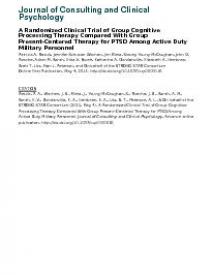A Randomized Clinical Trial of Group Cognitive Processing Therapy Compared With Group Present-Centered Therapy for PTSD Among Active Duty Military Personnel
Objective: To determine whether group therapy improves symptoms of posttraumatic stress disorder (PTSD), this randomized clinical trial compared efficacy of group cognitive processing therapy cognitive only version; CPT-C) with group present-centered therapy (PCT) for active duty military personnel. Method: Patients attended 90-min groups twice weekly for 6 weeks at Fort Hood, Texas. Independent assessments were administered at baseline, weekly before sessions, and 2 weeks, 6 months, and 12 months posttreatment. A total of 108 service members (100 men, 8 women) were randomized. Inclusion criteria included PTSD following military deployment and medication stability. Exclusion criteria included suicidal/homicidal intent or other severe mental disorders requiring immediate treatment. Follow-up assessments were administered regardless of treatment completion. Primary outcome measures Where the PTSD Checklist (Stressor Specific Version; PCL-S) and Beck Depression Inventory-II. The Posttraumatic Stress Symptom Interview (PSS-1) was a secondary measure. Results: Both treatments resulted in large reductions in PTSD severity, but improvement was greater in CPT-C. CPT-C also reduced depression, with gains remaining during follow-up. In PCT, depression only improved between baseline and before Session 1. There were few adverse events associated with either treatment. Conclusions: Both CPT-C and PCT were tolerated well and reduced PTSD symptoms in group format, but only CPT-C improved depression. This study has public policy implications because of the number of active military needing PTSD treatment, and demonstrates that group format of treatment of PTSD results in significant improvement and is well tolerated. Group therapy may an important format in settings in which therapists are limited.
Geachte bezoeker,
De informatie die u nu opvraagt, kan door psychotraumanet niet aan u worden getoond. Dit kan verschillende redenen hebben,
waarvan (bescherming van het) auteursrecht de meeste voorkomende is. Wanneer het mogelijk is om u door te verwijzen naar de bron
van deze informatie, dan ziet u hier onder een link naar die plek.
Als er geen link staat, kunt u contact opnemen met de bibliotheek,
die u verder op weg kan helpen.
Met vriendelijke groet,
Het psychotraumanet-team.
Reference:
Patricia A. Resick, Jennifer Schuster Wachen, Jim Mintz, Stacey Young-McCaughan, John D. Roache, Adam M. Borah, Elisa V. Borah, Katherine A. Dondanville, Elizabeth A. Hembree, Brett T. Litz, Alan L. Peterson, | 2015
In: Journal of Consulting and Clinical Psychology, 0095-8891 | mei | 1-11
http://www.ptsd.va.gov/professional/articles/article-pdf/id43929.pdf
In: Journal of Consulting and Clinical Psychology, 0095-8891 | mei | 1-11
http://www.ptsd.va.gov/professional/articles/article-pdf/id43929.pdf


